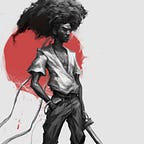Book Review: “Cocktail from the Savanna” by Ciku Kimani-Mwaniki
Snow White, Cinderella and your favourite soap operas rolled into an authentically Kenyan story
I read Cocktail from the Savanna in three sittings.
The first sitting I read nearly 90 pages unexpectedly.
The second sitting just 14 pages.
The third and final sitting I read nearly 250 pages unexpectedly.
The following are the thoughts provoked during and after.
First of all I wish I could do a semiotic read of the book. But I’ll be brief instead of deep.
Here we meet a number of narratives embedded underneath the surface of a spellbinding, richly Kenyan story.
The first narrative is Cinderella. A prince comes to the rescue of an impoverished girl. It is a common storyline in all soap operas.
The second narrative is Snow White and the Seven Dwarves. Here we see Snow White, a woman of incredible beauty, coexisting with noblehearted, hardworking little men. Ciku’s prince charming discovers Snow White cooking githeri for construction workers who love her like a sister.
And just like in Snow White, we are regaled with a tale featuring two drop dead gorgeous women. But it’s not an evil stepmother here, it’s the prince’s wife. The reader is in a state of tension wondering how the wife will take the matter of receiving a co-wife who is equally or more beautiful than herself.
The plot is fairly straightforward. Masikonde, a Maasai moran living and thriving in the city is being urged by his father to get a second wife because his wife Sinta is barren. Masikonde, though a notorious philanderer, loves his wife dearly. But he meets the dusty beauty Terian working as a cook in a construction site and he suffers a thunderbolt like Michael Corleone when he fell in love with a Sicilian girl while in exile in Sicily after killing his brother’s murderer.
Ciku understands the essence of good storytelling. Which is complication and delay. A good storyteller introduces complications to make the story spicy and unpredictable. A good storyteller drags out suspense and tension, delaying payoffs as long as possible. I think it’s how I ended up reading 250 pages in one sitting when my intention was only to read for an hour.
I brought up soap operas and the two fairy tales (the Disney princess versions) for a reason. They are stories written for women. The men in such stories are as women would want men to be. Fantasy men. Masikonde is a classic prince charming. He is super rich and handsome. But the modern woman wants more. So Masikonde is incredibly virile, an ox in bed. In the opening chapter we are introduced to his strong erection. But modern women want more still. The modern prince must be strong but also sensitive, assertive but also conflicted. Masikonde is strong in the business world but he is conflicted where his woman is concerned. He is virile and cheats on her but he loves her to a fault. He is paternal and patriarchal but he also truly cherishes his wife and cares for her opinions. One semiotic essay I read a while back about American daytime television described such a man as a woman’s man. A man designed to cater to the consumption needs of female viewers (or in this case readers).
Masikonde may be the hero of the story but the sisterhood is the architect. There is a God in this world (of the story) and its a woman (the writer hehe). There are two bad boys here tamed by the women they love. It’s an abiding fantasy for women to tame a bad boy. It’s another fantasy to be married by a rich man and live a luxurious soft life.
Here we find modernity clashing with traditionalism. The book zips back and forth between the city and the bundus. Dilemmas arise frequently for the characters pitting tradition against fashion, culture against modernity. The book is begging to be read from a feminist lens.
For one, some feminists might say the book panders to patriarchy by being pro-polygamy. But another group of feminists would argue the women in the book are living life on their own terms and living like queens on the patriarchy’s bill. The first group would then respond that the second group is not committed to the cause and only wants a kinder patriarchy. And Masikonde is that for sure, a kinder patriarchy. And me as a man I would argue feminists misrepresent patriarchy and what Masikonde and his father represent is the side of it feminists never acknowledge: men do want to protect, care for and provide for women. We do want to be Prince Charming.
Lulu Hassan and her husband at Citizen would do well to contact Ciku and strike a deal. Here is a soap opera to captivate Kenyan households on a bigger scale than Maria. And you know with a soap they can go on beyond where Ciku stopped telling the story.
My favourite character here might be Kokoi, the stoic, charming old lady. The Saitoti subplot injects sobering realism into the romance story. I loved Moraa also and I can’t help but suspect a huge chunk of the author’s DNA went into designing her (Moraa talks like you, Ciku, hehe, your phrases). I kept thinking it’s like the Greek Gods coming down to earth to help their favourites (so the author enters the story world as Moraa to help her favourite creation/character).
I am looking forward to reading more from Ciku, including the other cocktails which I am yet to read. I’m excited honestly.
